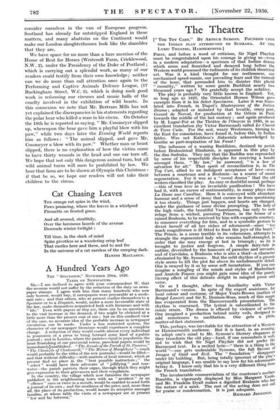A Hundred Years Ago
THE "SPECTATOR," NOVEMBER 20TH, 1830.
TAxes ON NEWSPAPERS.
Sir,—I am inclined to agree with your correspondent W. that the revenue would not suffer by the reduction of the duty on news- paper stamps. I agree with him that many hundreds who now only borrow, would buy, if newspapers were procurable at a mode- rate rate ; and that others, who at present confine themselves to a Spectator or to a Dispatch, would, under a more favourable state of the law, make themselves acquainted both with literature and with "life." Even with papers as they are, there can be no question as to the vast increase in the demand, if two might be obtained at a little more than the present cost of one ; but on this confined view of the ease, no accurate idea of the probable increase in newspaper circulation can be made. Under a less restricted system, the character of our newspaper literature would experience a complete change. A reduction of duty would enable almost every individual in possession of a press to bring forward some kind of a public journal ; and in London, where the parishes &Pll in population the Most flourishing of our-provincial towns, parochial papers would be immediatelyestablished. . "The Annals of the Parish of St. Pancras," "The Chronicle of Clerkenwell," " The Mirror of Marylebone" —(ouch would probably be the titles of the new journals)—would be filled—. and that without difficulty—with matters of local interest, which at present find no place in the " best possible instructors " the "select" " would have their advocate of " jellifying " and rose- water—the parish patriots their organ, through which they might give expression to their grievances and their complaints.
In the country, the village which now furnishes the newspaper published in the neighbouring town with an " accident"" or an offence " once or twice in a month, would be enabled to send forth a journal of its own ; and the smallness of the price, and, More than all, the place of its production, would insure its reception amongst families, at whose table the visits of a newspaper are at present "few and far between."


















































































 Previous page
Previous page